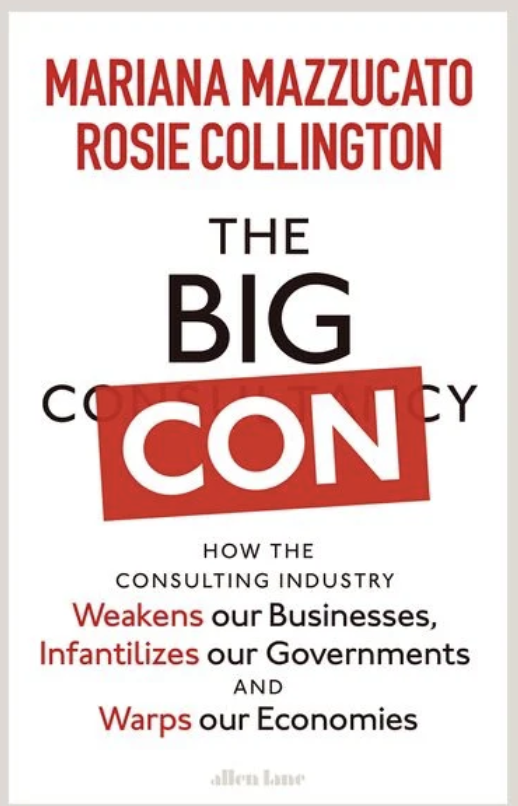THE STATE
The Big Con: How the Consulting Industry Undermines the State
In her book 'The Big Con', Mariana Mazzucato argues that governments are outsourcing more and more important tasks to consultants. Are they eroding the state's capacity from within? In our New Economy Short Cut, Mariana discussed this with 'Die Zeit' journalist Petra Pinzler.
BY
SONJA HENNENPUBLISHED
13. JULY 2023READING TIME
4 MIN
It has become common for private management consultants to be hired by government departments. In her new book, ‘The Big Con‘, co-authored with her PhD student Rosie Collington, IIPP economist Mariana Mazzucato criticises the consulting industry for gradually weakening the state from within. We have invited Mariana Mazzucato to discuss her critique and possible alternatives in our New Economy Short Cut format with Petra Pinzler from the leading German newspaper Die Zeit.

The ‘Big Con’ is an alarm bell
When you stop exercising, your muscles shrink, and your endurance diminishes. If someone would ask you to run a marathon, you would probably fail. A government is no different. When it ‘outsources its brains’, its capabilities hollow out, and it is less and less able to manage challenges. With this warning, Mariana Mazzucato began her conversation with Petra Pinzler.
The Big Con isn’t the first book Mazzucato wrote. She is known for her concept of mission-oriented policy making and her advocacy for a purpose-oriented relationship between the public and the private sector. What is new in ‘The Big Con’ is the deep dive into the ideological diminishment that has led to the erosion of state capacity, and the way in which the consulting industry has benefited from and accelerated this development.
“We have undertheorized the state – as an enabler, a market fixer. We have limited our vision to the state derisking the private sector, the ‘real’ actor in the economy.”
During the conversation with Petra Pinzler, Mariana Mazzucato emphasizes that this development is a mirror of broader economic trends and paradigms. Today, consultification is so advanced that the state is no longer even able to identify suitable partners. Instead of working with institutions and actors that bring together cutting-edge research, governments choose consultancies that have little or no knowledge of the issues on which they are supposed to advise. In their book, Mazzucato and Collington call this ‘infantilization’.
The transparency problem
Mazzucato also warned of the lack of transparency in the business model and activities of the consulting industry. Whereas in the past, consultants advised governments from the sidelines, in many countries they now influence and control the business of government. An opaque system of contracts has emerged, complicating the issue of accountability and visibly concentrating power in the hands of consultants. In some cases, this leads to absurd constellations. Like in South Africa, where the same consultant advises ESCOM, the main electricity supplier, and the treasury which is supposed to control ESCOM.
“The consulting industry has a clear conflict of interest. It is hired to make governments more capable while its goal is also to keep it infantile, in order to land follow-up contracts.“
In Australia, Mazzucato explained, McKinsey was hired to assess the costs of the green transition. It ended up largely underestimating the demand for green energy and overestimating the cost of its deployment. During the same time that McKinsey advised the government, it had ongoing contracts with 43 of Australia’s biggest polluters.
Changing the industry
According to Mazzucato, the market fixing mindset has limited our ability to understand and measure public value. Because value creation by governments goes beyond the creation of goods and services, measuring the impact of state action with a simple cost-benefit-mindset falls short. In her talk, Mariana Mazzucato suggested collecting examples of public value creation in a worldwide database to analyze what works and what doesn’t.
Two such examples she gave us directly. In Chile, the government set up Govlabs, a safe space for testing and developing innovations, and in Germany we now have PD, an inhouse consultancy whose rents are capped and that is held to higher accountability standards than external consultants. “An inward investment in state structure”, argues Mazzucato.
We need more of this, is the essence of the conversation between Mazzucato and Pinzler, more public venture capital thinking, more investment in qualified personnel, less bureaucracy, more collective intelligence and more public value creation.

